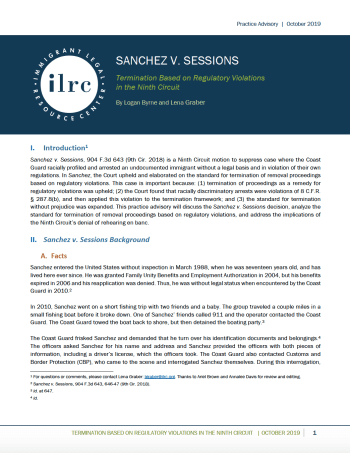
Sanchez v. Sessions was a landmark Ninth Circuit ruling on suppression of evidence and termination of removal proceedings. This advisory explains the decision, lays out the different legal standards for suppression and termination in immigration court, and highlights key holdings that practitioners can use to better defend their clients.
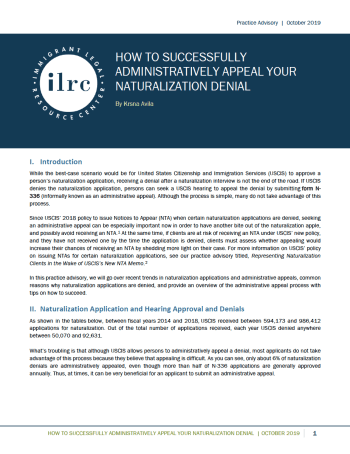
While the best-case scenario would be for United States Citizenship and Immigration Services (USCIS) to approve a person’s naturalization application, receiving a denial after a naturalization interview is not the end of the road. If USCIS denies the naturalization application, persons can seek a USCIS hearing to appeal the denial by submitting form N-336 (informally known as an administrative appeal). Although the process is simple, many do not take advantage of this process.
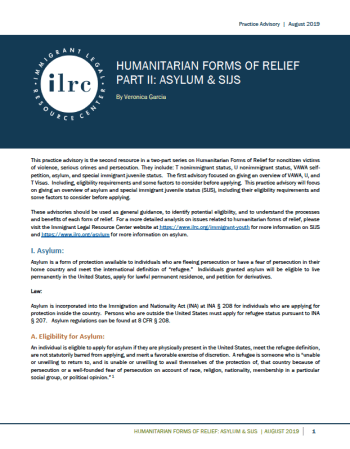
This practice advisory is the second resource in a two-part series on Humanitarian Forms of Relief for noncitizen victims of violence, serious crimes and persecution. They include: T nonimmigrant status, U nonimmigrant status, VAWA self-petition, asylum, and special immigrant juvenile status. The first advisory focused on giving an overview of VAWA, U, and T Visas. Including, eligibility requirements and some factors to consider before applying. This practice advisory will focus on giving an overview of asylum and special immigrant juvenile status (SIJS), including their eligibility requirements and some factors to consider before applying.
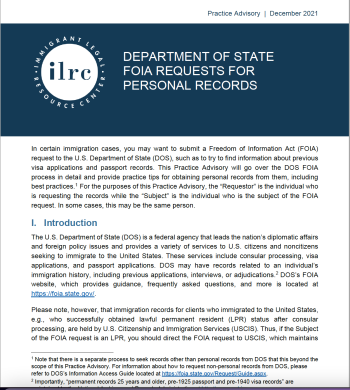
In certain immigration cases, you may want to submit a Freedom of Information Act (FOIA) request to the U.S. Department of State (DOS), such as to try to find information about previous visa applications and passport records. This Practice Advisory will go over the DOS FOIA process in detail and provide practice tips for obtaining personal records from them, including best practices.

In a flawed but significant decision, the Ninth Circuit held that California Penal Code § 243(d), battery with injury, is a crime of violence. United States v. Perez (9th Cir. July 11, 2019). Because of Perez, criminal defenders must assume that § 243(d) is a crime of violence and seek other dispositions when necessary. Immigration advocates should appeal adverse decisions and preserve the argument on appeal. See this Advisory for a discussion of the decision, alternative pleas, and suggestions for arguments.
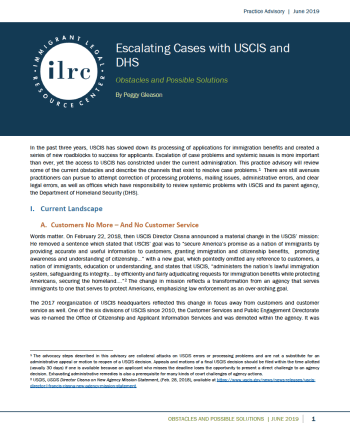
This practice advisory provides an overview of ways to advocate with USCIS and DHS components for solutions to individual case problems and systemic issues.
Noncitizen victims of violence, serious crimes, and persecution may be eligible for certain forms of immigration protection and status. These options are often referred to as Humanitarian Forms of Relief. They include: T nonimmigrant status, U nonimmigrant status, VAWA self-petition, asylum, and special immigrant juvenile status.
This advisory is the second in a two-part series on unlawful presence and unlawful presence waivers. This advisory covers the requirements and process for the provisional waiver, as well as updates and pitfalls to avoid in light of recent changes that have made pursuing the provisional waiver process more challenging. These include: State Department updates to public charge guidance and increased visa denials based on public charge inadmissibility at the consulate, Attorney General decisions in Matter of Castro-Tum and Matter of S-O-G & F-D-B- making it more difficult to pursue the provisional waiver in removal proceedings, heightened risk pursuing the conditional I-212 option as part of the provisional waiver expansion given updated enforcement priorities, and new considerations for preparing and filing provisional waiver cases in light of new USCIS policy memos on RFEs/NOIDs and Notices to Appear.

Practice Update: Issuance of Notices to Appear (NTAs) in Denied Humanitarian-based Immigration Cases
Over the last month, some practitioners have reported that USCIS has issued a number of NTAs in connection with denied U and T visa applications. Given these reports, ILRC, ASISTA, CAST, Freedom Network USA, American Association of Immigration Lawyers (AILA), and Asian Americans Advancing Justice-Los Angeles created a practice update to address some of the actions practitioners can take in individual cases as well as to support policy-level advocacy efforts.

Under the Immigration and Nationality Act (INA), any noncitizen who “within five years from the date of entry, has become a public charge from causes not affirmatively shown to have arisen since entry is deportable.” In current practice, this ground of deportability rarely comes up in pending removal proceedings or as a reason for the initiation of removal proceedings.